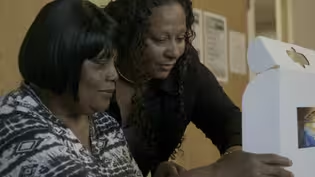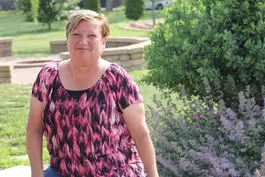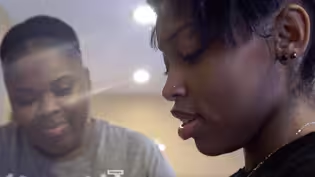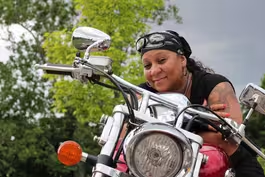
FIRSTHAND: Gun Violence
Season 7 Episode 7 | 24m 32sVideo has Closed Captions
Exploring the personal stories of people affected by gun violence in Chicago.
The number of gun violence victims in Chicago may fluctuate, but the psychological trauma in many neighborhoods is constant. How do wounded communities heal? FIRSTHAND: GUN VIOLENCE explores the personal stories of people whose lives have been affected and how each, in their own way, is transforming pain and struggle into hope and action.
Problems playing video? | Closed Captioning Feedback
Problems playing video? | Closed Captioning Feedback
Funding provided by the Corporation for Public Broadcasting. Additional funding provided by the John D. and Catherine T. MacArthur Foundation, The Wyncote Foundation and the National Endowment for the Arts.

FIRSTHAND: Gun Violence
Season 7 Episode 7 | 24m 32sVideo has Closed Captions
The number of gun violence victims in Chicago may fluctuate, but the psychological trauma in many neighborhoods is constant. How do wounded communities heal? FIRSTHAND: GUN VIOLENCE explores the personal stories of people whose lives have been affected and how each, in their own way, is transforming pain and struggle into hope and action.
Problems playing video? | Closed Captioning Feedback
How to Watch Local, USA
Local, USA is available to stream on pbs.org and the free PBS App, available on iPhone, Apple TV, Android TV, Android smartphones, Amazon Fire TV, Amazon Fire Tablet, Roku, Samsung Smart TV, and Vizio.
Buy Now
Providing Support for PBS.org
Learn Moreabout PBS online sponsorshipNOEMI MARTINEZ: The truth is, my son is gone.
We will never bring him back.
INDIA HART: My friend was killed on her way home from school.
TINA MCDUFFIE: Turning tragedy into hope and action.
HART: Everything I went through and everything I'm gonna go through, I know I have a good support system.
MARTINEZ: I know I've meant something to someone else, just based off me showing up.
MCDUFFIE: From WTTW, "Firsthand: Gun Violence" on Local, U.S.A. ♪ ♪ Gun violence, an American epidemic.
15 years ago, Noemi Martinez's son was shot and killed.
Now she helps other mothers to heal.
MARTINEZ: Robbie, right?
Hey!
Sign in for me.
Welcome.
So I'm kind of like the big sister around here.
You guys know that I lost my son, too.
It's been 15 years.
I just celebrated 15 years of my son's death on Memorial Day.
Y'all know these groups are important, because we need these groups to be able to cope with our loss.
'Cause you're gonna need some form of support with each other.
WOMAN: That's right.
MARTINEZ: Community of Survivors is a bunch of families who have lost a loved one in a violent way.
I lost my son to gun violence.
MARTINEZ (voiceover): And we come together as one.
WOMAN: If a person haven't been through it, they can't pat you on the shoulder, say it gonna be all right.
MARTINEZ: Mmm.
WOMAN: And, uh, I went somewhere three days, didn't know where I was, and looked in the mirror, and I didn't see me.
I was lost, man, I was lost, and I lost... MARTINEZ (voiceover): Our families don't get the support that they really, really need from loved ones, friends, 'cause everybody dissipates-- they disappear after a month or two.
The phone calls stop, and then, that's when the real deal happens.
Angela, I want you to tell us a little bit about how you got here, and why you're really here.
You know, I lost two.
(voice breaking): I lost one September 4, 2015, and turned around, and lose another one.
I don't wish this on nobody.
And the way that it is out here, it's hard.
I don't wish a parent have to suffer.
And when I say I suffer, I suffer a lot.
It was just so hard on me, and I just miss my kids.
I would've never thought that I would have to be burying two kids in two years apart.
It's hard.
MARTINEZ: Thank you-- that took a lot to say all of that.
And we usually do that in a first group, but because you're new in our group, we want you to feel love, we want you to feel welcome, and we also want you to know that we care and we're here for you.
And it's tough-- she said it herself.
Back to back.
TIFFANY: My name is Tiffany.
My son was killed January the 16th, 2017, on the porch at home.
Uh, he was my only child.
I cry every day.
I can't look at his Facebook page.
I can't look at his pictures half of the time.
I can't look at his clothes.
I can't go in his room.
It's, it's very hard.
So I came to this group today, thanks to Noemi, to try and get, you know, try and learn how to cope with it more better.
Because it's hard, it's, it's very hard.
And...
Without my parents, I probably wouldn't be here today.
It's sad, it's sad.
I keep hearing people say, "This killing got to stop.
This killing..." When is it gonna stop?
What do we have to do to make it stop?
What do we have to do to make these guns stop being picked up?
WOMAN: The only way something is gonna be done is if somebody stands up.
Somebody steps up and says something.
Nothing will be done if nobody, if everybody sits on their hands and don't do anything.
We need more people to step up and say, "Hey, you know what?
"This is our community.
"This violence that's happening, we don't want it no more in our community."
MARTINEZ: We want you to feel safe.
We want you to, to feel loved.
Unconditionally.
Sometimes love has to come unconditionally.
And there's so much love to give, so I want to give everybody a hug and thank you for coming-- and don't leave yet... (voiceover): Doing this work is what keeps me going, helping others like myself.
You know, uh, when you're dealing with homicide families, which is... (chuckles): You got to have, be tough to do this work.
I have sucked up so much pain, hurt from other families.
(sniffles) It's just a constant reminder that people need people.
We need people so that we can begin the healing process.
So when I share these tears, I share tears because I miss my son.
I love my son very much.
I can't bring him back, but I wish he was here.
♪ ♪ My story goes way, way, way back.
♪ ♪ First time having sex, I got pregnant, at 15 with my first-born son.
I was pregnant my first year of high school.
After that, I ended up dropping out of high school.
My mother helped me raise my children.
Andy was smart, he loved to play with cars.
Of course, he liked to go to the park.
I would take him to the park when I had a chance.
He might've been six or seven, and he had his missing tooth.
And he's, like, "Mom, my tooth is falling out, look!"
I said, "Well, let me pull it out!"
He's, like, "No, I'm gonna do it."
And he was just smiling and his tooth was out of his mouth.
That was just one of those memories that, you know, I ain't never forget that.
He was a good kid-- he was not in gangs.
I mean, he knew friends who made bad choices, but he was just a vibrant, full-of-energy kid.
♪ ♪ The guy that took his life, even though he came to my home with Andy, I never saw any signs of, you know, anything bad, or a bad vibe, or a bad feeling.
But I never questioned his relationship with this boy.
And I think I should have.
Andy was standing on a corner.
There's a school in that corner.
His friends are on the porch.
There was a car coming, an unknown car with males in it, and his friend didn't tell my son that he was going to shoot.
And he shot my son instead of the car.
I don't think he meant to shoot my son.
But then again, you know, I had those thoughts that he did it on purpose.
(sirens wailing) So, I waited for an ambulance to come.
They took him to Stroger Hospital.
I got the phone call.
They didn't want to tell me how serious it was.
My son was still alive when I got there, bandaged up.
He shot him in the most important part of his brain that kind of keeps us together as functioning.
The boy was there.
I didn't know he shot my son.
He was scared, he didn't know if my son was gonna live or die.
I didn't know who knew from the family that the shooter was there with us.
Amongst us.
And we waited, and he bled too much, and, uh, passed away.
You know, I didn't expect him not to survive.
(sniffs) And when he passed away, that was the worst day of my life.
You don't expect to bury your child.
(sniffs) I didn't know, you know, what to do, just hug and cry, and cry and hug, and... (sniffs) The detectives came over and said his friend did it.
I was just in shock when I found out who it was.
I wanted his parents to feel the same thing.
I was so full of anger, hatred.
I wanted somebody to do to him what he did to my son.
(talking in background) EMCEE (over mic): Y'all make sure y'all go back there to those resource tables, there a lot of information to get out to the community.
So go over there and check them out.
♪ ♪ - Hi, Paula!
- What's up, girl?
MARTINEZ: I started volunteering with a friend of mine.
She asked me to come out, "Let's do this march to stop the violence."
So I started with the volunteering, the marching, just sharing my son's story.
You know, noticing that there was so many families out there, that the killings in Chicago was really serious, and that our families are seriously suffering.
EMCEE (over mic): This is the Chicago Survivors table right here.
Tell me a little bit about y'all self.
- So what we do is, we respond to the Chicago homicides that occur here in the city.
(voiceover): Taking this job has been a very important part of my healing process.
And I believe that helping others like myself at this capacity has helped me take a deeper look into my own grief and loss.
How am I doing, myself?
♪ ♪ I'm not as angry as I used to be, because I have accepted that my son has passed on.
I do healthy things.
I don't want to isolate, I don't want to shut down.
I've been there, done that.
In the beginning phases of grieving, I shut down, I didn't want to be bothered with people.
Those sleepless nights.
I don't have to go through those things anymore, because my son doesn't want to see me suffer.
He doesn't want to see me go through that.
He wants me to live my life.
What sense does it make for me not to move on and do what I've always wanted to do, and be successful at it?
MCDUFFIE: India Hart has PTSD after her uncle, father, and friend were all victims of gun violence.
Now a high school senior, she must figure out how to heal.
♪ ♪ HART: I thought about not going to prom because I feel like it's not fair that my friend was most excited about prom, and then she got killed on her way to get a prom dress.
One of my best friends, she was killed in March.
WOMAN: Really?
What happened?
She was shot in her back.
- Oh, my gosh.
HART: But I know she would want all of us to go and have a good time.
She was pronounced dead on 13th.
(voiceover): She would be so excited because it's here.
Like, this is what we've been waiting for.
♪ ♪ DAMEKA EDWARDS-HART: No, they can't go outside right now.
This is supposed to be empty over here, remember?
WOMAN: Mm-hmm.
EDWARDS-HART: The sweets table is supposed to come over here to open up this area.
HART: My parents have been really helpful.
Can y'all work on the red carpet?
HART: They have been preparing for, like, three months.
Okay, so, the contingency plan is underway, because I, I saw raindrops as I was pulling up.
HART: My mom was in charge of how everything is gonna look.
But where is this candy table going?
See, I worry that if it start raining... HART: From deciding which dress I should wear to decorations, all the different snacks... - As soon as I get a second.
What am I doing?
I'm getting...
Wait, wait, wait.
HART: It was so hard finding a car.
My dad found me a car.
My dad's job was the car and the money.
(laughs) - Grab your... HART: His birthday was last week.
He didn't even do anything for his birthday because he's putting all his money towards my prom send-off.
I was, like, "What do you want to do for your birthday?"
"Nothing, I just want to spend my money on you."
Like, he told me he wants to spend his money on me.
I don't even know how to thank them.
They've been a lot of help this year, because I really needed them.
Out of all of my four years, this is the time that I really needed them.
♪ ♪ Just mentally, losing my friend, and my dad was shot.
♪ ♪ HART: A lot of traumatizing things.
Everything I went through and everything I'm gonna go through, I know I have a good support system.
- Everybody?
(people talking in background) ♪ ♪ EDWARDS-HART: As a mom, there's so much that I want to protect you from.
And it saddens me that there are several things that I can't.
And, you know, the violence surrounding our city is one of them.
And because I can't protect you from that, you know, I, all I can do is help support you in that regard.
- (exclaiming, talking in background) EDWARDS-HART: You need a listening ear, you know your dad and I are always here, giving you the necessary tools and resources that you need to overcome this.
- (exclaiming, talking in background) EDWARDS-HART: I think that I would say that you have post-traumatic stress from some of the things that you've encountered, especially, you know, when, when your dad was hit.
You were there when this happened to your father.
You were, you were right there, and you did not know the severity of his wound.
You did not know if he was okay.
(sirens wailing in distance) HART: So, it was on a Friday.
Friday, September 21.
They were, like, "Yeah, we're gonna do a balloon release "'cause tomorrow's your uncle's birthday, who was killed."
I was excited, 'cause when we do stuff like that, the whole family come out.
So, I pull up to the block, police already there.
(police radios running) It was so many of them, like, all you see is just blue lights.
And I already knew something bad was about to happen, 'cause my hands start shaking, and I just got that feeling, like, "Uh-oh."
I asked my cousin, like, "Where's my dad?"
I couldn't-- it was hard to point my dad out.
I was, like, "Daddy?"
So, I'm looking for him, and I see him, and then somebody just starts shooting, pow, pow, pow.
It was, like, nine shots.
And my dad got hit.
I didn't know where he had got hit.
I just knew he was on the ground.
I froze up.
And then, by the time I came back to reality, I'm screaming, and he not even right there no more.
I don't know where he went.
(sirens wailing) I just remember me consistently asking for my dad.
"Where's my dad, where's my dad, where's my dad?"
He was in the ambulance, and I'm crying, I'm banging on the door, like, I need to see him and see if he okay.
And then the paramedics opened the door, and my daddy, he, I seen him move his head.
He, like, "I'm okay, I'm okay."
I'm like... (exhales) I thought I lost my dad, so... That was literally the worst.
EDWARDS-HART: Oh, man, it impacted India greatly.
She could not sleep.
She would not sleep.
She even had a hard time sleeping when we pulled her into bed with us.
You know, because she said every time she closed her eyes, she replayed that event in her head.
HART: I got a lot in my head that I can't escape from.
Like, I keep replaying these events, and I don't know what's wrong.
Like, in school, I would always move my desk to where I'm facing everything, I can see everything, because, I don't know, I just want to pay attention to my surroundings.
Like restaurants-- if I go to a restaurant, I'm looking at all the exits, I'm trying to pay attention to who came in and stuff like that.
At parties, I try to be aware of everything.
It kind of, like, gets in the way of me having fun, because I'm so concerned about what's going on, I can't really enjoy myself in the moment.
♪ ♪ And I was talking to my mom, and I told my mom that I think I have PTSD.
But I was so scared to tell my mom, because I didn't know how she would react.
- You look good.
HART: Thank you.
- You look really, really pretty.
- Oh, my shoes.
- Yep.
EDWARDS-HART: She basically just said, like, "Mommy, I want to go to counseling."
I'm gonna be honest, like, in the Black community, you don't really hear about people going to therapy.
It's kind of like something that you don't really speak about.
Like, you kind of look to your family for these things, you know.
Put your heels on at the last second.
(voiceover): But to me, therapy is very important, especially if one feels like they need it.
I wish I had a ring.
EDWARDS-HART: You want to wear my engagement ring?
- A silver ring.
(voiceover): That same day, she reached out to a psychiatrist at her job.
I saw my therapist, and she gave me different coping techniques.
I have to tell myself, "Calm down, because it's gonna be okay."
"It's gonna be okay"-- that's me telling myself, "You, you can get through it, you can get through anything."
That's what I tell myself all the time.
EDWARDS-HART: If we all had, you know, the money, honestly, or the resources to just say, "You know what?
To hell with this, let's move."
Snap our fingers.
(snaps): We're in a different environment.
Everyone would do that.
But that's not the reality.
The reality is, this is what we're faced with, and we have to keep moving.
We have to support each other.
We have to seek therapy.
We have to do a lot of praying.
We have to, you know, try to do what we can, even if, even if it's small, do what we can to be the change that we want to see.
(people talking in background) Cheese.
(smacks lips) I'm ready-- I'm ready.
Y'all gonna be crying.
(crowd cheers and applauds) WOMAN: The class of 2019.
(crowd cheering and applauding) HART: I doubted myself a lot throughout my high school years, and I'm proud of myself that I actually did it.
Like, I was just thinking, "I did it."
Like, all my hard work has finally paid off.
(announcing graduates' names) (crowd cheering) (woman announces name, audience cheers) - India Hart.
(audience cheering) HART: But I'm just proud of my whole senior class, because it wasn't easy.
WOMAN: If I haven't said this before, I'm proud of you.
HART: Dareyona's one of my classmates that was killed in March of this year who would've graduated with us today.
WOMAN: I would like to thank all of my friends, family... HART: And I just think, like, it's crazy because that's all she literally, like, literally, that's all she talked about.
She could not wait to graduate, that's all she kept saying.
"I just want to graduate, I just want my diploma."
That's all she kept saying.
- ...that unfortunately lost... (audience shouting encouragement and support) (applauding) HART: So we, we got a teddy bear, like, a graduation teddy bear, and we all signed it and wrote a message to Dareyona, and then we presented it to her mom at graduation, along with her cap and gown.
So, she still was able to be there, spiritually.
- Though she is gone, she will never be forgotten.
(audience cheers) Her memory will live on in our hearts, and we want to celebrate her today, as well as present her mom, Ms. Katina Gunn, with her diploma.
(audience cheering and shouting) ♪ ♪ WOMAN: ...of the 2019 class, Dareyona Smith!
(audience cheering) ♪ ♪ (audience cheering) HART: I'm just happy that they were able to give her mom her diploma so that her mom know we didn't forget about her, and that she made it, too.
We all made it.
(audience cheering) When I was younger, I, like, I, I viewed the whole world a little bit different.
Like, when you were younger, stuff could just roll off your shoulder and stuff like that, but, like, when you get older, you start to notice stuff and then stuff starts to bother you.
(audience cheering) All the, like, experiences I've had over the past two, three years, it just really made me realize I don't want to be here.
Like, I think, as of right now, my mindset is, this is my last time really being in Chicago.
When I graduate college, I don't plan on coming back.
I just want to escape, and I want to try to...
I want to kind of, like, start over.
♪ ♪ ♪ ♪
FIRSTHAND: Gun Violence | Mothers Supporting Mothers
Video has Closed Captions
Clip: S7 Ep7 | 1m 28s | How do we support community members after the loss of a loved one to gun violence? (1m 28s)
FIRSTHAND: Gun Violence | Preview
Video has Closed Captions
Preview: S7 Ep7 | 30s | Exploring the personal stories of people affected by gun violence in Chicago. (30s)
FIRSTHAND: Gun Violence | The Mental Impact on Youth
Video has Closed Captions
Clip: S7 Ep7 | 2m 2s | For Chicago youth, the streets can be a high-stress ordeal, or life-or-death experience. (2m 2s)
FIRSTHAND: Gun Violence | Trailer
Video has Closed Captions
Preview: S7 Ep7 | 56s | Exploring the personal stories of people affected by gun violence in Chicago. (56s)
Providing Support for PBS.org
Learn Moreabout PBS online sponsorshipSupport for PBS provided by:
Funding provided by the Corporation for Public Broadcasting. Additional funding provided by the John D. and Catherine T. MacArthur Foundation, The Wyncote Foundation and the National Endowment for the Arts.



















